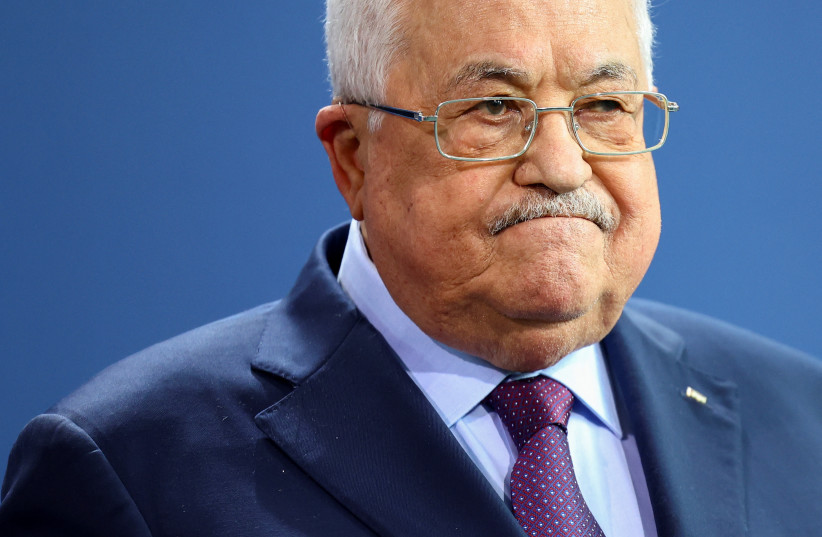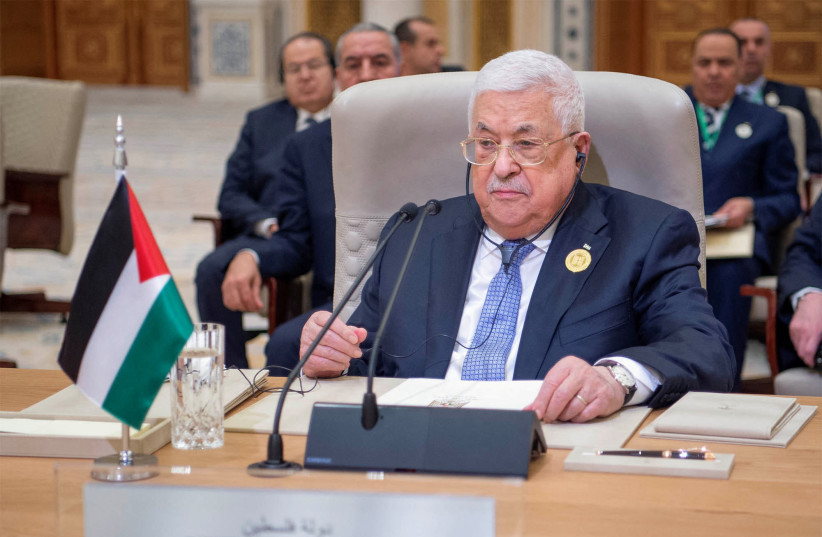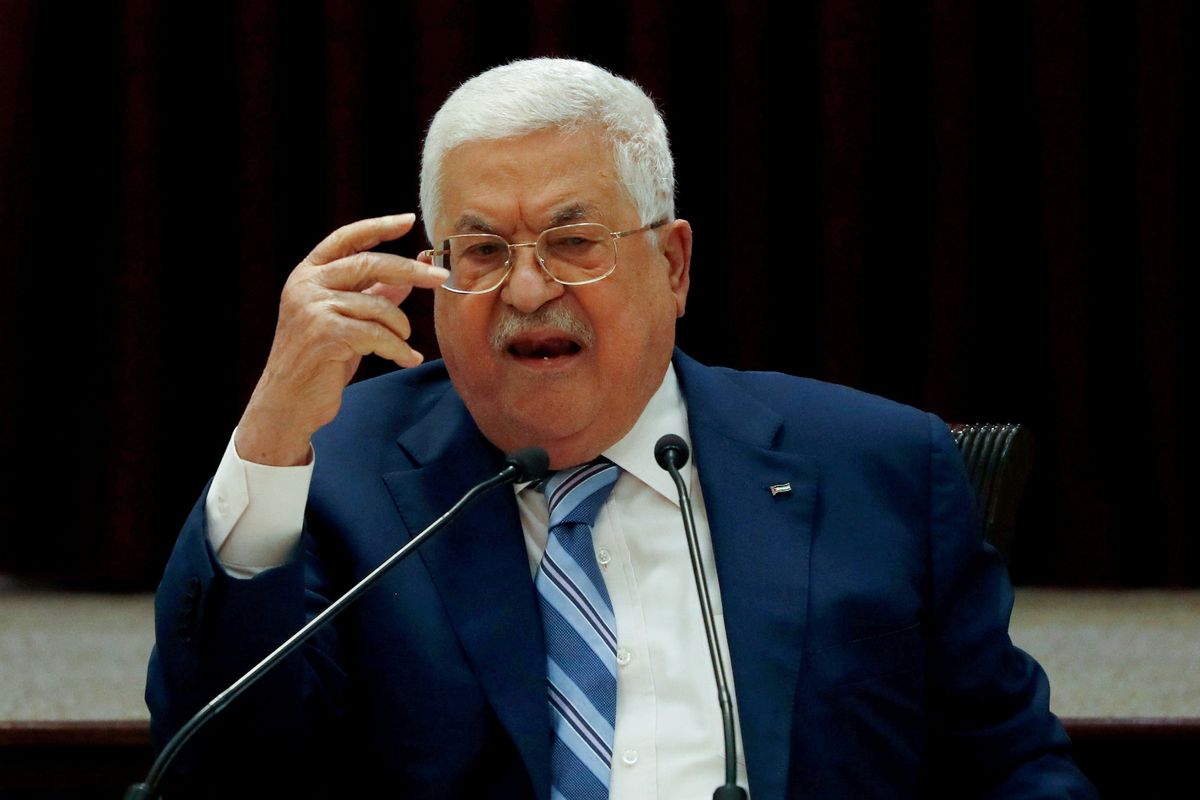Abbas vows to rebuild Jenin camp after deadly Israeli raid
IT'S NOT A CAMP IT'S A CITY
By AFP
Published July 12, 2023

Palestinian president Mahmud Abbas made a landmark visit to the Jenin camp, in the north of the occupied West Bank, a week after the largest Israeli raid there in years
Hossam Ezzedine and Gareth Browne
Palestinian president Mahmud Abbas vowed to rebuild the Jenin refugee camp during a rare and brief visit Wednesday, a week after a deadly Israeli raid destroyed much of the camp in the occupied West Bank.
Abbas, 87, hailed the Jenin camp as an “icon of struggle” during his first trip to the area in more than a decade, a period during which armed groups have gained popular support at the expense of his Palestinian Authority.
The two-day Israeli raid last week — the largest such operation in years, involving hundreds of troops, drone strikes and armoured bulldozers — killed 12 Palestinians and one Israeli soldier.
Israel views the densely-populated urban area, a stronghold of militant groups including Islamic Jihad and Hamas, as a “terrorism hub” and has launched frequent armed raids there since early last year.
Popular discontent with the PA, which cooperates with Israel on security, has been simmering in Jenin, and crowds last week heckled several visiting top officials of Abbas’s Fatah party, including deputy chairman Mahmoud Aloul.
On Wednesday, Abbas expressed determination to back Jenin’s reconstruction and security, describing the camp as an “icon of steadfastness and struggle” in a short address to cheering supporters.
“We have come to say that we are one authority, one state, one law,” Abbas said, warning against anyone who “tampers with the unity and security of our people”.
He vowed to oversee the reconstruction of the camp and the wider city to restore it “to what it was, or even better”.
– ‘Pride and honour’ –
As he concluded his visit, Abbas laid a wreath on the graves of Palestinians who lost their lives in recent Israeli raids.
A number of Arab countries have announced aid for the camp after last week’s offensive.
Ahead of Abbas’s arrival, hundreds of soldiers from the presidential guard patrolled the streets of the camp, an AFP journalist said, and snipers were positioned on rooftops.
His visit “is a strong and important message… that he stands with the Palestinian people in their resistance to the occupation,” Atta Abu Rumaila, Fatah’s secretary-general in the camp, told AFP.
Israel has occupied the West Bank since the 1967 Six-Day War and its forces regularly launch raids on Palestinian cities.
Abbas travelled by helicopter from Ramallah, seat of the Palestinian Authority, for the visit which lasted barely an hour.
The Palestinian president was flanked by potential successors, including Palestinian prime minister Mohammed Shtayyeh and Hussein al-Sheikh, secretary-general of the Palestine Liberation Organisation.
Abbas used his speech to issue a veiled threat at armed groups “undermining” Palestinian security.
“There will be one authority and one security force. Anyone who seeks to undermine its unity and security will face the consequences… Any hand that reaches out to harm the people and their stability shall be cut off,” he said.
Prior to Abbas’s arrival, a group of children were chanting “Katiba, Katiba, Katiba” at the camp in support of local armed group the Jenin Brigades.
Alaa Washahi, 27, speaking after Abbas’s departure, defended the militants in the camp.
“The Jenin Brigades are our pride and honour… their presence is part of our existence,” said the camp resident.
“The truth is we have suffered from the negligence of (Palestinian) officials. This is what the president must see with his own eyes.”
– Deteriorating security –
The Jenin camp was established in 1953 to house some of those among the 760,000 Palestinians who fled or were expelled from their homes in 1948 when Israel was created, an event Palestinians call the “Nakba” or “catastrophe”.
Over time, the camp’s original tents have been replaced with concrete buildings, and it now resembles an urban neighbourhood.
The camp, which houses about 18,000 people, was also a hotbed of activity during the second “intifada” or uprising of the early 2000s.
Over the past 18 months, the security situation in the camp has deteriorated with repeated Israeli raids, and the Palestinian Authority has little real presence there.
Abbas last visited Jenin in 2012 but did not tour the camp at the time.
While the PA remains somewhat present in the city, it has largely abandoned the camp to groups such as the Jenin Brigades, which Israel alleges is backed by Iran.
Abbas had previously visited the camp itself in 2004 while running for the Palestinian presidential election after the death of leader Yasser Arafat.
he-gb-rsc-jd/fz/it

Palestinian President Mahmoud Abbas addresses to the crowd during his visit to Jenin Refugee Camp, in which Israeli forces raid for two days, in Jenin, West Bank on July 12, 2023
July 12, 2023
Palestinian President, Mahmoud Abbas, visited the West Bank city of Jenin on Wednesday to check on the destruction caused by a recent Israeli military attack, Anadolu Agency reports.
Abbas arrived in the city aboard a Jordanian helicopter from Ramallah city, according to the official Palestinian Television station.
The Palestinian leader visited the Jenin Martyrs Cemetery, where the bodies of Palestinians killed during last week's military raid were buried.
Abbas was received, upon arrival in Jenin, by Prime Minister, Mohammad Shtayyeh, alongside other officials.
"The Jenin camp is an icon of resistance and steadfastness," Abbas said in a speech during his visit.
"The heroic Jenin camp withstood the aggression and made sacrifices for the sake of the homeland," he added.
READ: 900 Palestinians homes damaged in Israel attack on Jenin
The Palestinian President thanked the United Arab Emirates (UAE) and Algeria for their donations for the reconstruction of the Jenin camp.
"We will begin reconstruction immediately," Abbas stated.
"East Jerusalem is the capital of the State of Palestine and we will remain steadfast and will not leave [our land]," he added.
Wednesday's visit was the first by Abbas to Jenin since 2012.
Abbas usually does not make any visits to Palestinian cities, except for Bethlehem for Christmas.
Last week, Israel concluded its largest military operation in Jenin in more than 20 years.
At least 12 Palestinians were killed, including five children, and more than 140 injured in the offensive, according to the Palestinian Health Ministry.
The raid also left a massive trail of destruction across the West Bank city, with dozens of homes, vehicles, shops and utility lines destroyed.
READ: PA has 'lost its credibility,' Biden tells CNN
Abbas will meet with local residents and officials and receive a briefing about efforts to "rebuild" the city and its refugee camp.
Published: JULY 11, 2023

Palestinian President Mahmoud Abbas attends a news conference with German Chancellor Olaf Scholz, in Berlin, Germany, August 16, 2022.
(photo credit: REUTERS/LISI NIESNER)
Palestinian Authority President Mahmoud Abbas is scheduled to visit the city of Jenin and its refugee camp on Wednesday, more than one week after the large-scale Israeli military operation there, PA presidential spokesperson Nabil Abu Rudaineh announced on Tuesday.
Abbas will meet with local residents and officials and receive a briefing about efforts to “rebuild” the city and its refugee camp in the aftermath of the Israeli military operation, Abu Rudaineh said.
This will be Abbas’s first visit to Jenin since 2012, when he briefly visited the city to offer condolences over the death of former governor Kadoura Musa.
It will be his first visit to Jenin Refugee Camp since he was elected PA president in 2005.
Abbas will be accompanied by PLO Executive Committee Secretary-General Hussein al-Sheikh and General Intelligence Service chief Majed Faraj.

Jordanian military helicopter will transport Abbas
Palestinian sources said a Jordanian military helicopter will take Abbas and the senior officials from Ramallah to Jenin.
PA Prime Minister Mohammad Shtayyeh and members of his cabinet, as well as senior Fatah officials, will receive Abbas upon his arrival in Jenin, the sources said.
On the eve of the visit, hundreds of Palestinian security officers were deployed in the city and its refugee camp in a show of force designed to send a message that the PA has not lost control of the area.
The rare visit comes amid growing criticism of the PA and its security forces for failing to protect the Palestinians during the Israeli military operation. PA security forces stayed in their bases during the raid and made no attempt to engage the Israeli troops.
The visit also comes amid reports that the PA security forces have lost control of the city and its refugee camp, where Hamas and Palestinian Islamic Jihad have a strong presence.
Additionally, the PA has been denounced by several Palestinians for its continued crackdown on members of Hamas and Palestinian Islamic Jihad in the West Bank.
The two groups said on Tuesday that the PA security crackdown on their members could sabotage efforts to hold a meeting of leaders of all the Palestinian factions in the Egyptian capital of Cairo at the end of this month. Abbas had invited the leaders of the factions to the meeting in response to the Israeli military operation. Abbas said the purpose of the meeting was to reach agreement on “a comprehensive national vision and achieve [Palestinian] unity.”
Two senior officials from Abbas’s ruling Fatah faction, Mahmoud al-Aloul and Azzam al-Ahmed, were driven away from the funerals of some of the Palestinians killed by the IDF during the operation. Aloul and Ahmed later returned to Jenin Refugee Camp and met with local residents and gunmen belonging to Fatah and Palestinian Islamic Jihad.








